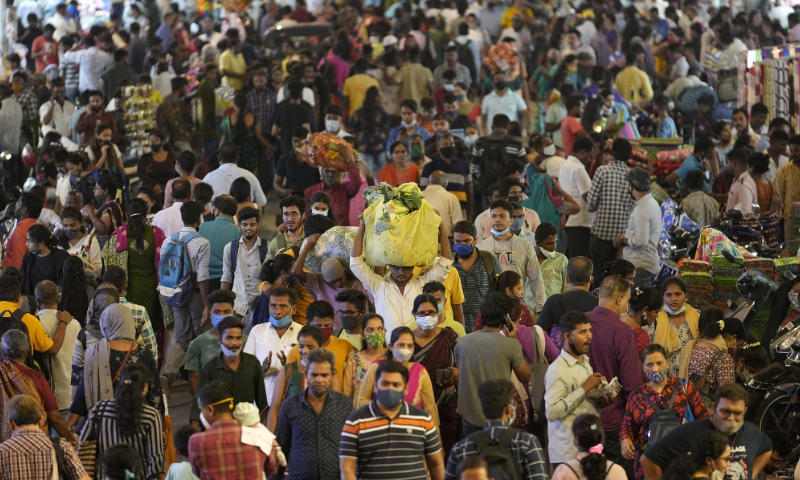India needs a more open economy to leverage economic virtue of its 1.4 bln population

People crowd a market area outside a train station in Mumbai, India, on March 12, 2022. Photo: VCG
India is expected to overtake China as the most populous country in April, according to an article the Economist published in January. A report by the Associated Press on April 11 said that demographers are unsure exactly when India will take the title as the most populous nation. But they know it's going to happen soon, if it hasn't occurred by now. As India's economic rapid growth in recent years is deemed inseparable from its huge "demographic dividend," how to further give full play to the economic potential of the huge population and tackle the accompanying challenges is a key question facing New Delhi.
The rapid growth of India's population has indeed provided strong support for the country's economy. However, the advantages of population growth in recent years have not been reflected in growth of consumption and investment as predicted. Instead, it has put pressure on food, healthcare, education and jobs. Obviously, a large population can become a heavy burden on the economy if not properly utilized. Faced with a rapidly growing population, Indian economic policymakers must first address an ongoing employment crisis.
In economics, a demographic dividend is usually linked with the level of the labor force. India has an advantage in relation to its demographic structure, but, admittedly, the overall level of education in India is not high. Although labor-intensive industries do not have high requirements for workers' educational level, the overall low quality of India's labor force has indeed hindered the progress of its industrial development.
From the perspective of India's industrial structure, the largest pillar industry in India is agriculture, accounting for nearly 60 percent of the total population. The second largest pillar industry in India is the information technology industry. According to statistics, about 410,000 people are engaged in information and software-related industries. In order to create more jobs, it is imminent for India to accelerate its industrialization process.
In recent years, India has ramped up efforts to boost the development of industries like electronic equipment, electric vehicles (EV) and new energy by attracting foreign leading enterprises to build plants in India. However, the plan was not going well as foreign giants like Apple and Tesla have not largely expanded investment in India. Instead, traditional manufacturing companies such as GM have also chosen to leave India despite its market potential, according to media reports.
The reason why these foreign industry giants did not choose India is firstly because the country does not offer the required access to labor market talent, infrastructure, and public services. Secondly, India's many practices to protect domestic industries have also spooked many foreign companies. To name a few: high tariffs, tax inspections and the banning of apps. India's manufacturing and industrial ambition is seriously hampered by its protectionist attitude.
If India wants to attract global manufacturing to invest in the country and improve employment, it should continuously open its domestic market and deepen integration across global and regional industrial chains. This requires India not only to avoid moving further toward protectionism, but also to let go of the interference of geopolitical thinking when promoting economic and trade cooperation.
At present, India has imposed many unreasonable restrictive measures on Chinese companies that contribute to the Indian economy, which in turn seriously hindered the development of its own manufacturing. In recent years, India has lagged behind Vietnam in absorbing low-end industrial chains that moved out China during its industrial upgrade. This is mainly because India lacks the willingness to integrate into the Asia-Pacific supply chain. Its reluctance against cooperation with China has seriously hindered the development of related domestic industries.
Indian economic policymakers should realize that despite geopolitical tensions with China, expanding cooperation with companies in the world's second largest economy and global manufacturing hub will help India expand electronics equipment, EV, new energy and other key industries. Hopefully, India will adopt a more pragmatic and open approach on the issue of economic, trade and investment cooperation with China.
The author is a reporter with the Global Times. bizopinion@globaltimes.com.cn


